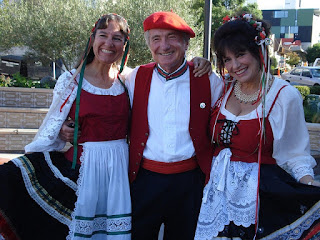Italy culture people food and festivals
Italian culture is steeped in the arts, family, architecture, music and food. Home of the Roman Empire and a major center of the Renaissance, culture on the Italian peninsula has flourished for centuries. Here is a brief overview of Italian customs and traditions.
Languages of Italy
The official language of the country is Italian. About 93 percent of the Italian population speaks Italian as native language, according to the BBC. There are a number of dialects of the language spoken in the country, including Sardinian, Friulian, Neapolitan, Sicilian, Ligurian, Piedmontese, Venetian and Calabrian. Milanese is also spoken in Milan. Other languages spoken by native Italians include Albanian, Bavarian, Catalan, Cimbrian, Corsican, Croatian, French, German, Greek, Slovenian and Walser
Family life in Italy
"Family is an extremely important value within the Italian culture," Talia Wagner, a Los Angeles based marriage and family therapist, told Live Science. Their family solidarity is focused on extended family rather than the west's idea of "the nuclear family" of just a mom, dad and kids, Wagner explained.
Italians have frequent family gatherings and enjoy spending time with those in their family. "Children are reared to remain close to the family upon adulthood and incorporate their future family into the larger network," said Wagner.
Religion in Italy
The major religion in Italy is Roman Catholicism. This is not surprising, as Vatican City, located in the heart of Rome, is the hub of Roman Catholicism and where the Pope resides. Roman Catholics make up 90 percent of the population, though only one-third of those are practicing Catholics, while the other 10 percent is composed of Protestant, Jewish and a growing Muslim immigrant community
Italian cuisine
Italian cuisine has influenced food culture around the world and is viewed as a form of art by many. Wine, cheese and pasta are important part of Italian meals. Pasta comes in a wide range of shapes, widths and lengths, including penne, spaghetti, linguine, fusilli and lasagna.
For Italians, food isn't just nourishment, it is life. "Family gatherings are frequent and often centered around food and the extended networks of families," said Wagner.
No one area of Italy eats the same things as the next. Each region has its own spin on "Italian food," according to CNN. For example, most of the foods that Americans view as Italian, such as spaghetti and pizza, come from central Italy. In the North of Italy, fish, potatoes, rice, sausages, pork and different types of cheeses are the most common ingredients. Pasta dishes with tomatoes are popular, as are many kinds of stuffed pasta, polenta and risotto. In the South, dishes are dominated by tomatoes, either served fresh or cooked into sauce, and also includes capers, peppers, olives and olive oil, garlic, artichokes, eggplant and ricotta cheese.
Italian Society & Culture
Italian Family Values
- The family is the centre of the social structure and provides a stabilizing influence for its members.
- In the north, generally only the nuclear family lives together; while in the south, the extended family often resides together in one house.
- The family provides both emotional and financial support to its members.
Italian Style
- Appearances matter in Italy.
- The way you dress can indicate your social status, your family's background, and your education level.
- First impressions are lasting impressions in Italy.
- The concept of 'bella figura' or good image is important to Italians.
- They unconsciously assess another person's age and social standing in the first few seconds of meeting them, often before any words are exchanged.
- Clothes are important to Italians.
- They are extremely fashion conscious and judge people on their appearance.
- You will be judged on your clothes, shoes, accessories and the way you carry yourself.
- Bella figura is more than dressing well. It extends to the aura your project too - i.e. confidence, style, demeanour, etc.

























No comments:
Post a Comment